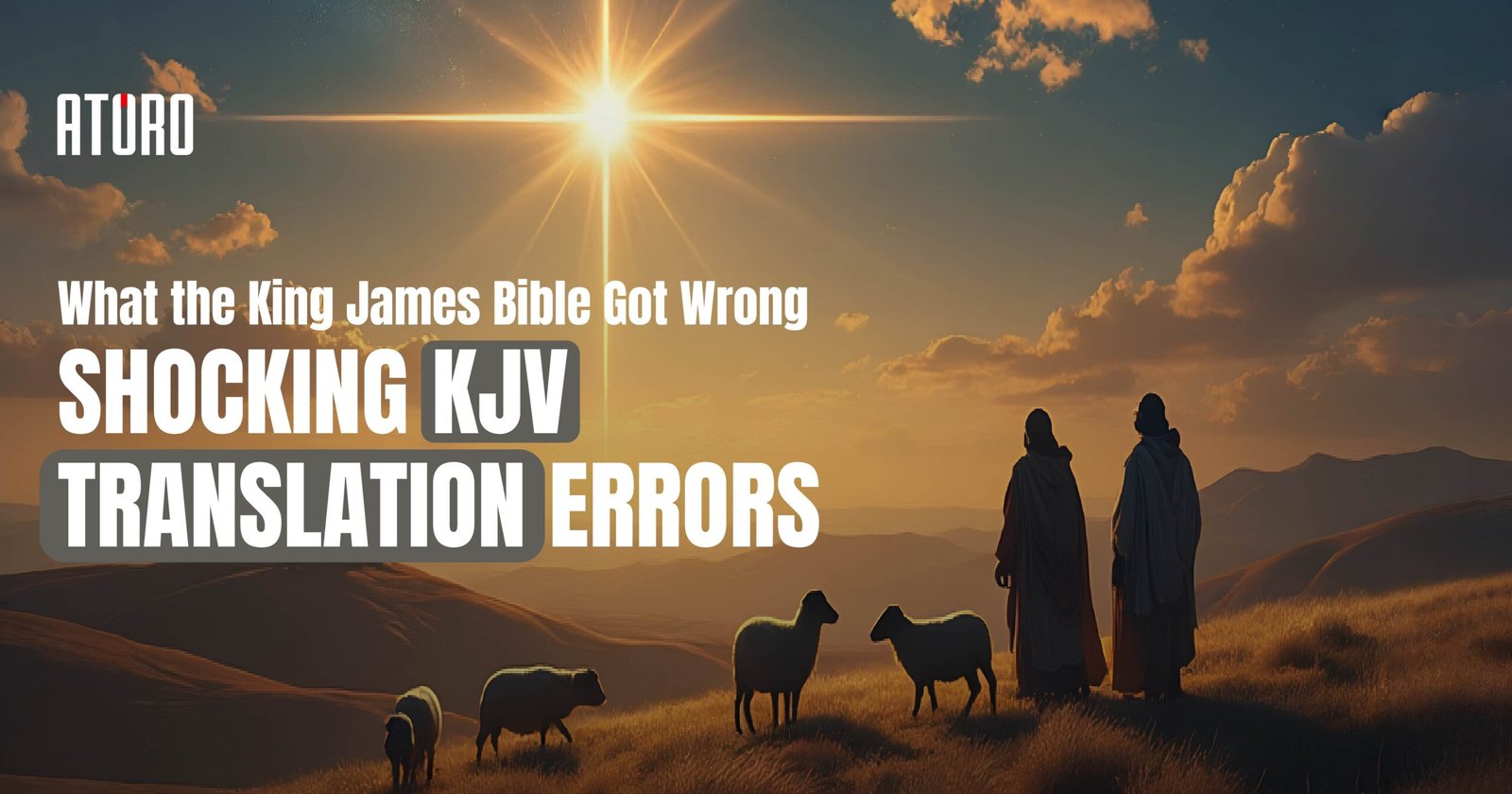KJV translation errors have shaped how millions understand God’s word. But what if those translations were wrong? For centuries, the King James Bible has been treated as the gold standard of scripture. Yet, beneath the poetic language and familiar verses, some major changes were made. Changes that shifted entire doctrines.
In Proclaiming the Gospel of God’s Coming Kingdom on Earth, ATORO boldly reveals what the King James Bible got wrong, from misused words like “Gentiles” to promises of heaven that were never really there. These aren’t minor slip-ups. They change how we see salvation, identity, and God’s covenant itself.
This blog explores the most shocking examples. And why they matter more than ever.
The Problem with “Gentiles”
One of the most repeated KJV translation errors lies in the word Gentiles. In the original Hebrew and Greek scriptures, the word used was simply nations, not Gentiles. But when the King James translators replaced “nations” with “Gentiles,” it rewrote a foundational truth.
Why does it matter? Because it shifts the message. Scripture originally focused on the children of Israel, God’s covenant people. However, inserting the word “Gentiles” makes it seem like the Bible’s message was meant for all people, everywhere, without distinction. That’s not how the original text read.
The book Proclaiming the Gospel of God’s Coming Kingdom on Earth explains this in detail. It shows that what the King James Bible got wrong wasn’t just a word. Instead, it was the direction of the entire narrative. Moreover, readers today believe in a gospel for everyone, not realizing how a single mistranslation changes the meaning of God’s promises.
This simple switch, nations to Gentiles, has confused countless believers. Consequently, it altered how we interpret who God’s people are. Furthermore, it continues to affect how churches preach salvation, covenant, and identity.
Heaven on Earth? What the Kingdom Really Means
Another overlooked but critical example of KJV translation errors is the phrase “Kingdom of heaven.” Sounds familiar, right? But the original scriptures actually used the term “Kingdom of the heavens,” plural and specific.
This small change is just a grammar tweak. However, it redirects the entire meaning of Jesus’ message.
The original phrase points to a future kingdom on Earth, a physical reign of God that always promises to the descendants of Israel. But by changing “the heavens” to “heaven,” the translators opened the door for a new belief system: righteous souls go to heaven after death. Jesus didn’t preach this message.
Moreover, according to Proclaiming the Gospel of God’s Coming Kingdom on Earth, this is another example of what the King James Bible got wrong. It changes our focus from Earth to the sky, from a promised land to a vague afterlife. Generations of believers have prayed, “Thy kingdom come,” without realizing they’re asking for a kingdom on Earth. Not a one-way ticket to heaven.
These subtle shifts in language carry deep consequences. And once you see them, it’s hard to unsee.
The Jesus Everyone Misquotes
The verses are quoted as often or misunderstood as deeply – Luke 23:43. In the King James Bible, Jesus says to the thief on the cross, “Verily I say unto thee, Today shalt thou be with me in paradise.”
But there’s one problem. The KJV translation error here isn’t about the words themselves. It’s about punctuation.
In the original Greek manuscripts, there were no commas. Translators added punctuation later. They inserted a comma before “today” and took it as Jesus’ promise of heaven that same day. However, if there’s a comma after the “today” word, the phrase becomes: “Verily I say unto thee today, thou shalt be with me in paradise.” A future promise. Not a same-day reward.
This small punctuation mark flips the timeline of salvation. It turns a resurrection-based promise into a belief that souls go straight to heaven. This concept contradicts other parts of scripture and the central message of Proclaiming the Gospel of God’s Coming Kingdom on Earth.
It’s yet another case of what the King James Bible got wrong. Not in a doctrine alone, but in how it presents the words of Christ Himself. And it’s more than a technicality. It shapes what people believe happens after death.
What’s at Stake: Faith, Identity, and the Covenant
We’re not just talking about words when we mention KJV translation errors. We are talking about identity. You can’t just build faith based on belief. It is built on understanding who God speaks to and what He promised. Most importantly, to whom do those promises belong?
Through mistranslations like “Gentiles” and “kingdom of heaven,” the King James Bible had blurred those lines. It made God’s covenant seem universal, available to all by default, when the original texts clearly addressed the descendants of Abraham, Isaac, and Jacob. The House of Israel.
Proclaiming the Gospel of God’s Coming Kingdom on Earth argues that this shift has led many believers to misunderstand their place in God’s plan. It’s not just about salvation. It’s about covenant. When we lose sight of who God’s promises were made to, we risk building our faith on assumptions rather than truth.
This is what the King James Bible got wrong. It redefined the audience. Doing so changed how people saw themselves in the scripture story. That’s why these translation choices matter so much.
Not Just a Translation Problem. A Global Deception
These KJV transition errors aren’t just innocent mistakes. They serve a deeper deception. According to Proclaiming the Gospel of God’s Coming Kingdom on Earth, they have helped fuel a global life. That everyone is included in God’s covenant just by believing.
The book ties this distortion to Revelation 12:9, where the Devil is said to deceive the whole world. By subtly altering words, meanings, and timelines. The message of scripture has been softened, reshaped, and redirected.
This isn’t just about theology. It’s about truth versus tradition. And it raises a serious question. If the foundation of your faith comes from a mistranslation, what does that mean for what you believe?
Why This Book Matters
Proclaiming the Gospel of God’s Coming Kingdom on Earth doesn’t just point out KJV translation errors. It challenges readers to think deeply about what they already know or understand.
This book strips back the layers of tradition and mistranslation to show what scripture actually says. It’s bold, unapologetic, and rooted in direct comparisons between the original texts and the King James version. More importantly, it helps readers understand what the King James Bible got wrong. And why those errors still matter today.
So, if you’ve ever felt something doesn’t quite add up to what you knew about salvation, identity, or the kingdom of God, this book offers answers worth exploring.


